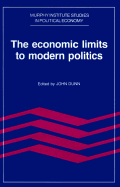Book contents
- Frontmatter
- Contents
- Preface
- List of contributors
- The economic limits to modern politics
- Introduction
- 1 The economic limits to modern politics
- 2 Free trade and the economic limits to national politics: neo-Machiavellian political economy reconsidered
- 3 The political limits to premodern economics
- 4 On some economic limits in politics
- 5 International liberalism reconsidered
- 6 Capitalism, socialism and democracy: compatibilities and contradictions
- Index
5 - International liberalism reconsidered
Published online by Cambridge University Press: 01 June 2011
- Frontmatter
- Contents
- Preface
- List of contributors
- The economic limits to modern politics
- Introduction
- 1 The economic limits to modern politics
- 2 Free trade and the economic limits to national politics: neo-Machiavellian political economy reconsidered
- 3 The political limits to premodern economics
- 4 On some economic limits in politics
- 5 International liberalism reconsidered
- 6 Capitalism, socialism and democracy: compatibilities and contradictions
- Index
Summary
World politics both creates opportunities for modern governments and imposes constraints on the range of actions that it is feasible for them to pursue. One way to think about these opportunities and constraints is to analyze the operation of the contemporary international political–military system, or the world political economy, and to consider how these systems affect state action. Much of the modern study of international relations is devoted to this task. Yet another perspective on the impact of world politics on states can be gained by asking how perceptive observers of politics have reflected on these issues in the past. This approach, which looks to the history of political thought for insights into contemporary international affairs, will be pursued here. Although the form and intensity of the constraints and opportunities created by the contemporary world system are different from those in earlier centuries, the impact of international politics and economics on state action has been evident for a long time, and has occasioned a great deal of sophisticated commentary.
At some risk of blurring differences between thinkers of broadly similar inclinations, three major Western schools of thought on this subject can be identified: Marxist, realist and liberal. Each has been influential, although it is probably fair to say that realism has been the creed of Continental European statesmen for centuries, and that since World War II it has been predominant in the United States as well.
- Type
- Chapter
- Information
- The Economic Limits to Modern Politics , pp. 165 - 194Publisher: Cambridge University PressPrint publication year: 1990
- 45
- Cited by

